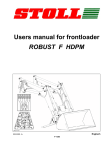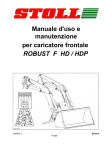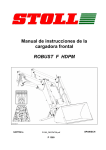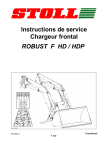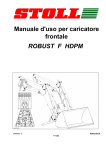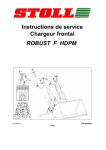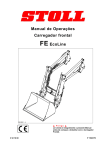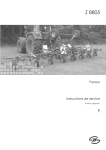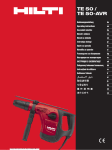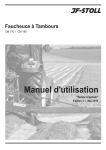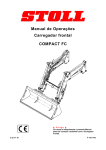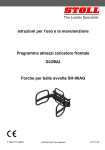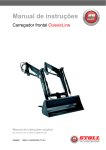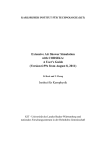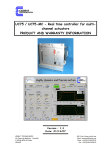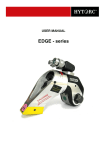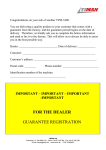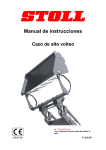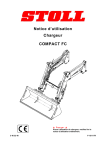Download P1359_Robust F HD-HDP-Englisch
Transcript
(2007 =>) Users manual for frontloader ROBUST F HD / HDP Englisch 3311981 b P 1359 STOLL ROBUST F HD / HDP Table of contents 1 Before operating 2 General safety information and prevention of accidents 2.1 Safety decal (=> 2007) 2.2 Safety decal (2007 =>) 3 Technical data 4 Description 5 Practical Application 5.1 Operation 5.1.1 Operation 5.1.2 Operation 5.2 Hydraulic system 5.3 Attaching of drive-in loader unit 5.4 Removal of the drive-in front loader 5.5 Mechanical single lever control unit SLV (option available) 5.5.1 Type 5.5.2 Definition of working directions 5.5.3 Definition of actuating directions 5.5.4 Additional functions joystick buttons 5.5.5 Operation fast stroke device 5.6 Quick installation and removal of attachments 5.7 Hydraulic implement control with switchable fast-stroke valve 5.8 Hydraulic diagram HE + HD 5.8.1 HD (standard – basic version) 5.8.2 HD (full equipped version) 5.9 Electrical Equipment HD 5.9.1 HD (standard – basic version) 5.9.2 HD Fully equipped electric version with 2-pole socket 5.9.3 HD Fully equipped electric version with 7-pole socket 5.10 Toogle switch 3rd Control circuit 5.11 Hydraulic parallel guidance of the implements 5.11.1 Advantages of hydraulic parallel motion ( HS = Hydraulical Selfleveling ) 5.11.2 Operation 5.11.3 Function 5.12 Control unit for "parallel motion" 5.13 Hydraulic diagram HDP 5.13.1 HDP (standard – basic version) 5.13.2 HDP (full equipped version) 5.14 Electrical Equipment HDP 5.14.1 HD (standard – basic version) 5.14.2 HDP Fully equipped electric version with 2-pole socket 5.14.3 HDP Fully equipped electric version with 7-pole socket 6 Ballasting the tractor during front loader operation 7 Service and maintenance 8 Safety and Prevention of Accidents 8.1 Driving on public roads 8.2 Allowed maximun load capacity of pallet fork tines 8.3 Comfort - Drive 9 Decalcomania 9.1 Decalcomania frontend loader Robust F "right" 9.2 Decalcomania frontendloader Robust F "left" 9.3 Decalcomania frontendloader Robust F "right" (2007 =>) 9.4 Decalcomania frontendloader Robust F "left" (2007 =>) 10 Troubleshooting 11 EC-Declaration of Conformity page 3 5 12 13 14 16 18 18 19 20 21 22 23 26 26 27 27 28 29 30 31 33 33 34 35 35 36 37 38 39 39 40 42 43 44 44 45 46 46 47 48 49 50 53 53 54 54 56 56 57 58 59 60 62 1. Before operating Prior to operating frontend loader please read and observe the operator's manual and all safety instructions! In this operating instruction booklet we have marked all paragraphs which refer to your safety with this sign. Pass on all safety advices also to other users. Operation in accordance with specifications! The STOLL frontend loader is built solely for normal agricultural use (operated in accordance with specifications). It may only be operated with tools especially provided by STOLL for this purpose. It may only be attached to field tractors and other tractive machines for which it is designed and offered by STOLL (intended use). Use of frontend loader Robust F for any other purpose tan defined above is considered as operation which is not in accordance with specifications and is undertaken as such at the owner's risk. Observation of operation and maintenance instructions specified by manufacturer shall also be taken to the part of operation in accordance with specifications. The frontend loader Robust F may only be operated, serviced and repaired by personnel who are familiar with these functions and who have been instructed of the inherent dangers. 3 -- ▲ -- DANGER -- ▲ -It is forbidden to approach within reach of this machinery while in use. All relevant accident prevention, safety, health and street regulations must be observed according general or local regulations of user country. -- ▲ -- CAUTION -- ▲ -STOLL must regretfully decline responsibility for damage resulting from unauthorised changes to loader or equipment and any misuse. Tightening torque for screws class screws M8 M8x1 M10 M10x1,25 M12 M12x1,5 M12x1,25 M14 M14x1,5 M16 M16x1,5 M18 M18x2 M18x1,5 8.8 Nm (lb-ft) 23 (17) 25 (18) 46 (34) 49 (36) 80 (59) 84 (62) 88 (65) 130 (96) 138 (102) 190 (140) 210 (155) 270 (199) 280 (206) 300 (221) 10.9 Nm (lb-ft) 33 (24) 35 (26) 65 (48) 69 (51) 110 (81) 118 (87) 123 (91) 180 (133) 190 (140) 270 (199) 290 (214) 380 (280) 400 (295) 420 (310) screws M20 M20x2 M20x1,5 M22 M22x2 M22x1,5 M24 M24x2 M27 M27x2 M30 M30x2 5/8“UNC (normal) 5/8“UNF (fine) 3/4"UNC (normal) 3/4"UNF (fine) 4 class 8.8 10.9 Nm (lb-ft) Nm (lb-ft) 380 (280) 530 (391) 400 (295) 560 (413) 420 (310) 590 (435) 510 (376) 720 (531) 540 (398) 750 (553) 560 (413) 790 (582) 630 (464) 890 (656) 680 (501) 950 (700) 930 (686) 1310 (966) 995 (733) 1400 (1032) 1260 (929) 1770 (1305) 1370 (1010) 1930 (1423) 175 200 380 420 (129) (147) (280) (310) 245 (180) 280 (206) 530 (391) 590 (435) 2. General safety information and prevention of accidents Most accidents which occur in agricultural enterprises are the result of safety rules being disregarded by personnel. Safety precautions A careful operator is the best operator. Most accidents can be avoided by observing certain precautions. To help prevent accidents, read and take the following precautions before working or operating with the frontloader or servicing it. Equipment should be operated only by those who are responsible and instructed to do so. Safety decal 3449070a has to be affixed in drivers visibility! Throughout this manual you will regognize text in italics, preceded by the words NOTE, ATTENTION, IMPORTANT, CAUTION, WARNING or DANGER. Such text has the following significance: Machine safety -- ! -- NOTE -- ! -This text stresses a correct operating technique or procedure. -- ! -- ATTENTION -- ! -This text warns the operator of potential machine damage if a certain procedure is not followed. -- ▲ -- IMPORTANT -- ▲ -This text informs the reader of something that he needs to know to prevent minor machine damage if a certain procedure is not followed. 5 Personal Safety -- ▲ -- CAUTION -- ▲ -The word CAUTION is used where a safe behavioural practice, according to operating and maintenance instrucions and common safety practices will protect the operator and others from accident involvement. -- ▲ -- WARNING -- ▲ -The word WARNING denotes a potential or hidden hazard which could possibly cause serious injury. It is used to warn operators and others to exercise due care and attention to avoid a surprise accident with machinery. -- ▲ -- DANGER -- ▲ -The word DANGER denotes a forbidden practice in connection with a serious hazard. Failure to follow the CAUTION, WARNING and DANGER instructions may result in serious bodily injury or even death. -- ▲ -- CAUTION -- ▲ -1. Front loaders may only be attached to tractors equipped with a lockable hydraulic system, otherwise it becomes necessary to install a shut-off valve. -- ▲ -- CAUTION -- ▲ -2. The hydraulic system must be locked during travel on public roads and while the tractor is parked. 6 -- ▲ -- DANGER -- ▲ -3. Never convey or raise people in a bucket or other attachment! -- ▲ -- CAUTION -- ▲ -4. The maximum roadspeed with attached load beam is 25 km/h, the maximum working speed is 10 km/h. Check front tyres for correct loader operation air pressures according tractor user manual ! -- ▲ -- DANGER -- ▲ -5. Never carry out repair, cleaning or lubricating jobs with raised load beam! Lower or remove beam. Lower load beam after completion of work. 7 -- ! -- ATTENTION -- ! -6. Never drive the tractor off with a jerk if the attachment is fully loaden or in its highest position. Drive downhill when pushing together or collecting material, whenever possible load in a trough or dip; never drive across a gradient with raised load beam; increase rear track width of the tractor as necessary and never drive with a narrower then standard front track width, even with tractors equipped with an adjustable width front axle. -- ! -- ATTENTION -- ! -7. Do not turn the tractors steering wheel when driving into the material to be loaded. -- ! -- ATTENTION -- ! -8. Operate the front loader only with its own approved attachments. Never carry out jobs with implements not designed for the work. The tool and the loader arm/loader unit may only be installed and removed by the operator. -- ▲ -- DANGER -- ▲ -9. Lifting pallets or bales over the cab creates an increased risk of the load falling onto the operator when the tractor is moving. The roll-over protection structure (ROP) can only ensure a partial protection from objects falling onto the driving position. 8 Special tools such as pallet forks or bale handling tools are designed in a way that prevents the load from falling down onto the tractor. Stacking of bales is not allowed because of the risk that upper bales could fall down and injure persons. The tip angle of the tool for loader without selfleveling (HD typ) or if selfleveling is deactivated (HDP type special function) will be increase when raising up the liftarm. The user has to compensate this increase manually with joystick to eleminate the risk of goods falling down and of injuring persons.. -- ▲ -- DANGER -- ▲ -10. Sojourn within the working range (3m) is prohibited. Stay clear away of raised loader arms or unsecured loads. Please recognize and follow relevant machine safety regulations for loader work according DIN EN 12525/A1:2006. 9 -- ▲ -- DANGER -- ▲ -11. Travel with loaded bucket on public streets is prohibited! -- ▲ -- DANGER -- ▲ -12. Rules for prevention of accidents issued by the professional associations and organisations as well as the regulations applying to construction and use of any legally prescribed protective devices must be observed at all times. For transport and travelling on public roads local country street regulations have to be maintained. -- ▲ -- CAUTION -- ▲ -13. Always store the loader on a solid area and with the tool installed. Be sure the prop stands are locked in a safe position. -- ▲ -- IMPORTANT -- ▲ -14. Good visibility is essential during frontloader operation (clean cab windows; no risk of dazzling; sufficient lighting of the work area in the dark). -- ▲ -- DANGER -- ▲ -15. Ensure that the front loader is a safe distance away from overhead power lines. Danger to life in case of contact! 10 -- ▲ -- DANGER -- ▲ -16. Liquids leaking under high pressure (Diesel fuel, hydraulic oil) can penetrate the skin and cause severe injury. When injured see a doctor immediately! Danger of infection! -- ▲ -- CAUTION -- ▲ -17. Before the first use of the loader and then at least once a year all hoses must be checked by an expert worker for their operational safety and replaced if required. The time of use of the hoses should not exceed six years including a maximum storage time of two years. The replacement hoses and pipings must meet with the implement manufacturer's technical standards! -- ! -- ATTENTION -- ! -Installation Instruction! Hydraulic pipes (pipes and screwed joints) are ex works only unassembled pre mounted. After final laying of pipes at the tractor all screwed joints must be tightened and retightened after first 5 working hours.! -- ▲ -- CAUTION -- ▲ -18. When searching for leaks appropriate aids should be used because of the danger of injury. -- ! -- ATTENTION -- ! -19. If there is installed any equipment at the tractor, which may interfere with loaderarm, tool or any attachement, it has to be removed before executing loader work. 11 2.1 Safety decal (=> 2007) -- ! -- ATTENTION -- ! -3377500a Danger of severe injury Only remove the loader if a tool is fitted -- ! -- ATTENTION -- ! -3377570a Danger in the working area! Do not allow anybody to come within the machine's working area, particularly if the equipment is raised. 12 2.2 Safety decal (2007 =>) -- ! -- ATTENTION -- ! -3310350a Danger of severe injury Only remove the loader if a tool is fitted -- ! -- ATTENTION -- ! -3431550a Danger in the working area Do not allow anybody to come within the machine's working area, particularly if the equipment is raised. 13 -- ! -- ATTENTION -- ! -3430500a Instructions for HYDRO-FIX hydraulic connections Method to be used for connection and removal of HYDRO-FIX devices. -- ▲ -- CAUTION -- ▲ -3430510a Danger from high pressure! Stop the engine and discharge residual pressure from the system. -- ! -- NOTE -- ! -3377220a Lifting points - Connection points to be used when lifting the loader without front tools -- ! -- ATTENTION -- ! -3375741b Functions selector Select O = rapid unloading Select I = hydraulic 3rd service -- ! -- ATTENTION -- ! -3411720b Control for hydraulic selflevelling (only for loader type HDP) -- ! -- ATTENTION -- ! -3343590a Tool coupling control Sticker applied to the tool coupling bar; coupling is safe when side “A” is level with the tool holder bush. 14 3. Technical data WILHELM STOLL Maschinenfabrik GmbH Postfach 3, 38266 Lengede Bahnhofsraße 21, 38268 Lengede Telephone +49 (5344)20-0 Telefax +49 (5344)20-182 Telephone +49 (5344)20-266 Telefax +49 (5344)20-183 Telephone +49 (5344)20-131 Telefax +49 (5344)20-137 Manufacturer Spare parts Service Dealer Tractor Type plate Wilhelm Stoll Maschinenfabrik GmbH D 38268 Lengede Type S-No. LIFTARM 765321 Robust F 30. 01 30F1HxSEFAMC100 Fabr-No. 1234567 weight xxx kg year 2007 Made in Germany / Fabriqué en Allemagne Performence data Function Code suitably for loader xx F x x NS xF Ax Cx xx 4 30 - 44 kW (40 - 60 PS) 30 - 55 kW (40 - 75 PS) < 70 kW (95 PS) 59 - 96 kW (80 - 130 PS) > 82 kW (110 PS) x Performence data 04 F x x NS 0x F x x NS 1x F x x NS 3x F x x NS 5x F x x NS 10-15 x 30-36 50-51 - - - - - x - - - - - - x - - - - - - - x suitably for loader Function Code xx F x x HS xF Ax Cx xx 30 - 55 kW (40 - 75 PS) < 70 kW (95 PS) 59 - 96 kW (80 - 130 PS) > 82 kW (110 PS) 5-8 8 10-15 x 08 F x x HS 1x F x x HS 3x F x x HS 5x F x x HS 15 30-36 - - - x - - - - - - x 50-51 - - - - - - x 4. Description Type: 4 HD 5 HD 8 HD - HDP 10/15 HD - HDP 30/31 HD - HDP 35/36 HD - HDP 50/51 HD - HDP for tractors up to 45 kW (60 HP) for tractors up to 51 kW (70 HP) for tractors up to 56 kW (75 HP) for tractors up to 70 kW (95 HP) for tractors between 59 – 89 kW (80 – 120 HP) for tractors between 66 – 96 kW (90 – 130 HP) for tractors exceeding 82 kW (110 HP) THE RANGE OF "STOLL" FRONT LOADERS, SERIES "ROBUST F" Types 4 HD - 5 HD - 8 HD - 10/15 HD - 30/31 HD - 35/36 HD - 50 HD - 8 HDP - 10/15 HDP 30/31 HDP - 35/36 HDP - 50/51 HDP are DRIVE-IN FRONT LOADERS, they are absolutely uniform for all makes of tractor and consist of: The loader unit, completely assembled by the manufacturers, ready for installation (boom with quick-change frame, hydraulic implement actuation, hydraulic rams, hydraulic lines, parking legs and drive-in pillars), tractor attachment components, front protection and various hook implements, mainly for agricultural and forestry use. Loader main components: Explanation: Lifting arms Implement coupling Implement Type HD Hydraulic implement actuation, double-acting tipping rams. Lifting arms Implement coupling Implement Type HDP Hydraulic implement actuation, double-acting tipping rams and parallel guidance. The liftarm are manufactured in a box section construction according to the principle of a beam with identical moment of resistance. 16 A quick-change frame for the effortless installation and removal of the implements is part of the standard delivery range of the boom. The complete unit is secured to the attachment components by means of a tensioning wedge. The parking support legs are required for installation and removal of the loader unit. Installation or removal can be accomplished by one person without bodily effort in 2 to 4 minutes. -- ! -- ATTENTION -- ! -- You must have changed empty weight of the tractor registered by the relevant Technical Control Board! As the front loader mounting parts are rigidly fitted to the tractor, they involve a change of the tractor empty weight which is subject to registration according to C.&U.R. It is therefore essential that the increased empty weight of the tractor (without front loader) is registered by the local authority in the vehicle documents (registration certificate). 17 5. Practical Application 5.1 Operation General The usual tractor driver skill and a pronounced empathy with the function of the front loader suffice for first-class, fault-free operation. Good front loader work soon becomes habit. Nearly all front loader jobs can be carried out in genuine one-man-operation. -- ▲ -- DANGER -- ▲ -Sojourn within the working range is prohibited. Stay clear away of raised unsecured loads. (Machine safety >> DIN EN 12525/A1:2006) Adequate space should be available for loading operations in the yard. In the field the front loader/tractor requires wellsupporting ground, in the yard a paved surface. -- ▲ -- CAUTION -- ▲ -The maximum roadspeed is 25 km/h, the maximum working speed during loading work with installed implements is 10 km/h. 18 -- ! -- ATTENTION -- ! -Do not turn the steering wheel while driving into the material to be loaded, rather drivein straight ahead! Avoid too rapid lowering and especially rearresting a load, which may result in shock loads being imposed onto the front axle. Beyond that, all accident prevention regulations laid down by the agricultural insurance association and the rules of the C.&U.R. must be complied with. 5.1.1 Operation decal (=> 2007) 19 5.1.2 Operation decal (2007=>) Installation Removal 1. Unlock hand lever Attention! Do not remove the loader unless a bucket or attachment is fitted. 2. Drive tractor forward 1. Apply the tractor parking brake and lower the loader until it is resting on the ground. 3. until the pins contact the glide rail jaw 2. unlock the hand lever 4. Stop the tractor and apply the parking brake. 3. lower the parking stands 5. Relieve hydraulic system pressure (see tractor operators manual) and connect Multi Quick coupler and electrics. 4. Continue to lower the loader until the rear pins are resting on the glide rails. 6. Raise the loader until the loader arm 5. Disconnect theMultiQuick coupler and retaining pins are fully registered in the jaw electrical connections. Attention! Do not operate the bucket or attachment cylinders until the loader arms are securely locked. 7. Raise the loader and fold up the prop stands 8. move the hand lever downwards to the locked position 6. Reverse the tractor away from the loader assembly. Attention! Check the tightness of the locking mechanism at regular intervals, adjust if required. 20 5.2 Hydraulic system Front loaders may only be attached to agricultural tractors which are equipped with a lockable hydraulic control unit. Otherwise it becomes necessary to provide a shut-off valve between control unit and the hydraulic line, leading to the loader beam. -- ▲ -- CAUTION -- ▲ -When traveling on roads, doing maintenance or when loader is detached the safety locking of control lever (Z) have to be moved to the blocked position, or the required hydraulic valve (shut-off valve or Hydro-Fix) should be closed. 21 5.3 Attaching of drive-in loader unit (figs. LHO1002A and LHO1003A) -- ▲ -- DANGER -- ▲ -The loader arm/loader unit may only be installed and removed by the opera tor. (Fig. LHO1002A) Unlatch gripping lever (1) and drive the tractor forward into the parked loader beam, until the pins (2) of the pillars contact the stop in the arresting hook. Brake the tractor in this position by applying the handbrake. Connect the hydraulic line by means of the couplings (Fig. LHO1005A) resp. Hydro-Fix (Fig. LHO1004A). Connection hydraulic pipes with hydraulic flexible tubes: 1 Loader arm lower 2 Loader arm raise 3 Implement scoop 4 Implement dump (Fig.LHO1003A) Move control valve lever to position “Raise”, until the pins (2) contact the arresting hooks completely at both sides. Lift the loader beam, until the bucket clears the ground completely. Use gripping lever to lock.Fold the prop stands swiftly against the loader arm and allow the locking cam to catch into the slot of the prop stand. 22 -- ! -- ATTENTION -- ! -After initial installation adjust locking device (see fig. LHO1003A) as follows: Loosen nut (4), adjust bolt (5) to ensure the tensioning process commences in position (b) of the gripping lever, which should be noticeable preloaded in position (c). Tighten locknut (4). Bleed the hydraulic rams by lifting and lowering the loader beam several times. The locking mechanism has to be checked at each attachment and removal as well as occasionally if the frontloader remains mounted on the tractor for a longer period. Correct the setting if necessary. 5.4 Removal of the drive-in front loader (Figs. LWP1076A and LHO1007A) -- ▲ -- DANGER -- ▲ -The loader arm/loader unit may only be installed and removed by the operator -- ▲ -- DANGER -- ▲ -Do not park loader beam without attached bucket or other implement, otherwise danger of tipping over! Lower balance beam without pressure up to the ground. Unlock gripping handle (1) and fold prop stands down onto the ground. Drive forward slightly, allow control unit thereby to remain in position “Lower” until the pins (2) glide out from the arresting hooks and lie on the glide path (A). (Driving forward is omitted in the case of double-acting hydraulic rams, because the pins (2) will slip out of the arresting hook through the retraction of the hydraulic cylinders). Drive backwards until the prop stands engage and the pillar take off from the glide path (A). 23 Disconnect the hydraulic lines at the couplings (see fig. LHO1025A resp. LHO1026A) and at the electric cable. Fit dust cap and blanking plug. Drive tractor out. -- ▲ -- IMPORTANT -- ▲ -Loading and lightly raising the front loader attachment as well as thorough lubrication of the glide path A (see fig. LHO1006A) will facilitate loosening the tensioning wedge (see fig. LHO1003A). Unfolding the prop stands To fold out the prop stands, move their feet sideways towards the tractor and at the same time press them downward until the locking cams come loose from the slots. Then unfold the prop stands down to the ground Prop stands are automatically locked in this position by the spring-loaded support struts.Be sure that the ground is solid enough. 24 Folding up the prop stands To fold up the prop stands use one hand to pull up the support strut against the resistance of the integrated torsion spring in the direction of arrow A and at the same time push the prop stand in the direction of arrow D to prevent the support strut from locking into engagement. Pull the prop stand out of the locking area and then move it swiftly against the loader arm. -- ▲ -- DANGER -- ▲ -When handling the prop stand there is a danger of injury by pinching. Keep hands clear of the area between prop stand and loader Fold up the prop stand until it is locked by the rubber spring catch. Grease the rubber spring catches occasionally. When installing and removing the loader arm follow the instructions of the decal placed on the loader arm pillar. Hydro-Fix -- ! -- ATTENTION -- ! -It is essential that the male and female connectors of the Hydro-Fix hose couplers are clean when the hoses are coupled. Relieve all pressure from the hydraulic system before coupling the hoses. Damage to the seals could result if the hoses are coupled under pressure . 25 5.5 Mechanical single lever control unit SLV (option available) Assembly instruction see A874-english Stoll-ID-Nr: 3330580b.pdf -- ! -- NOTE -- ! -5.5.1 Type NIMCO WK-200 or compatible EHS Equipment EHS DW / DW Extend of supply Single lever control unit for FL with doubleacting beam-cylinders and double-acting implement cylinders. Items may depend from customer order -- ! -- NOTE -- ! -On special request partner solutions are available, implementing other joystick and bowden cable variants or combined valve stets. Please find reference information on partner service manual for technical details and service parts informations which may variate from Stoll specifications. -- ! -- ATTENTION -- ! -To combine lift arm and tractor monted bracket sets from different build years with different electric sockets the following kits are available: Stoll-ID 3447220 KIT EL. 2-pol > 7-pol with plug for liftarm side. Stoll-ID 3447230 KIT EL. 2-pol > 7-pol with 7-pol socket and adapter bracket for tractor side 26 Later chapters (or Stoll document A1877 in KIT) showing all relevant electric harness diagramms for these alternatives. Please allow only qualified service personal to do these assembly work. 5.5.2 Definition of working directions 5.5.3 Definition of actuating directions All hydraulic functions can be operated with one hand only. The entire ROBUST-series can, as an option, be equipped with the single lever control for the frontloader. High comfort of operation, simple but also precise and safe control of the loader arm – all this united in a single handy lever. The unit consists of the control lever in the cab and the control valve with its Bowden cables fitted outside to the frontloader mounting. The four hydraulic couplings of the control valve are situated in line which has several advantages: The valve can be kept flat, it takes little room and it doesn’t obstruct view to the front axle. 5 Grundfunktionen: A frontloader - lift B frontloader - lower C attachment - scoop D attachment - discharge S frontloader - floating position 3 combined functions: A-D lift + discharge B-C lower + fill B-D lower + discharge 27 -- ! -- NOTE -- ! -Combined functions are not possible with HDP loaders! With HD or HDPM Loaders only limited, we can not proceed two “pressure-functions” at the same time! 5.5.4 Additional functions joystick buttons Two electric switches are integrated into the control lever which, according to the hydraulic equip-ment of the frontloader, actuates the following functions: >> To operate 3rd service rams in tools (such as silage forks, bale forks etc) Robust F HDPM Loader - Button 1: 3rd Auxiliary circuit Robust F HDPM Loader - Button 2: 4th Auxiliary circuit Robust F HD Loader - Button 1: 3rd Auxiliary circuit/ Bucket Rapid Discharge function Robust F HD Loader - Button 2: 4th Auxiliary circuit. Robust F HDP Loader - Button 1: Suspend Bucket Self Levelling action >> for optimized handling and filling with loose bulk cargo Robust F HDP Loader - Button 2: Robust F HDP Loader - Button (3): 3rd Auxiliary circuit/ Bucket Rapid Discharge function. 4th Auxiliary circuit >> additional button(3) will be delivered only with customer order -- ! -- NOTE -- ! -For HYDRO-LOCK option (hydraulic implement lock) there is a seperate switch box in delivery. -- ▲ -- DANGER -- ▲ -ACHTUNG: NEVER use any free joystick button for HYDRO-LOCK function ! 28 5.5.5 Operation fast stroke device The fast-stroke facility can be engaged by depressing the push button S2, situated at the implement actuation control lever. The fast stroke valve achieves a jerky discharge of the bucket, which in turn ensures perfect emptying of seven sticky materials. -- ! -- ATTENTION -- ! -* Engage additional fast stroke device only when tipping the bucket. Engaging the faststroke valve during tilting of the implement will immediately reverse the tipping mode of the bucket. * Do not carry out grading operations with fully extended implement rams! The bucket should not be tilted down by more than 45°. A larger tilting angle can cause serious damage to both frontloader and tractor. -- ▲ -- CAUTION -- ▲ -Before any travel on public roads be sure that the locking lever of the single-lever control unit is moved to locking position. Function fast-stroke operation: The oil displaced during fast-stroke operation from the piston rod area of the implement ram flows directly to the piston area of the ram. The quantity of oil supplied by pump to the piston area is therefore increased by the quantity of oil displaced from the pistonrod area. This increased oil quantity results in the high tipping speed achieved. Fig. LHO1029A 29 5.6 Quick installation and removal of attachments -- ▲ -- CAUTION -- ▲ -The loader arm/loader unit may only be installed and removed by the operator. Pick-up of implements 1. Tilt the quick-change frame approximately 15 degrees forwards by means of the hydraulic implement control (Fig. LHO1011A). 2. Pull out the handle for the sliding pin on the left hand side of the quick change frame. Turn handle to the right until the bushing bottoms against the lower end of the slotted hole. This will prevent the handle sliding back out of its unlocked position (Fig. LHO1011A). 3. Drive tractor and loader beam with shaft under the implement hooks and raise in direction F, until the shaft fully contacts the hooks. The attachment will swivel with the lugs into the quick-installation frame. (Fig. LHO1011A) 4. Tilt the quick-change frame backwards until the sliding pins engage in the lugs (Fig. LHO1012A). The implement is now rigidly connected to quick-attachment frame and loader beam. 30 -- ! -- ATTENTION -- ! -Before any use of the front loader, make a visual check to be sure that the pins of the locking bar are in position and the tool is correctly and safely secured to the loader arm (fig. LHO1013A). 5. After taking up the implement, adjust the visual indicator in such a way that the top ends of guide tube (2) and connecting rod (1) stay flush if the implement is horizontal. The guide tube (2) can be adjusted by moving the clip (3) on the cylinder barrel. Removing the tools is a reversal of the mounting procedure 5.7 Hydraulic implement control with switchable fast-stroke valve (Fig. LHO1028A and LHO1029A) Advantages of work with hydraulic implement control 1. Tipping the bucket at ground level considerably increases the break-out force, the material to be loaded is loosened from the subsoil and the loading process is facilitated and speeded up. 2. Optimal filling of the bucket by correct positioning at ground level. 3. Precisely graduated discharge through stepless tipping and tilting of the bucket - best utilisation of the load space available. 4.A rattle function eases emptying the tool when handling sticky material 31 -- ▲ -- CAUTION -- ▲ -Before any use of the front loader, make a visual check to be sure that the pins of the locking bar are in position and the tool is correctly and safely secured to the loader arm. -- ▲ -- DANGER -- ▲ -Before any use of the front loader, make a visual check to be sure that the Switch is in position and safely secured to the loader arm. 32 5.8 Hydraulic diagram HE + HD 5.8.1 HD (standard – basic version) Hydraulic diagram fast stroke device Robust F HD 1 lowering 2 Lifting 3 Pouring 4 Scooping A Liftarm B Attachment Z Ignition S1 Rapid-motion on 33 5.8.2 HD (full equipped version) HD with 3rd and 4th control service and hydraulic attachment lock A Liftarm B Attachment C 3. Control service D 4. Control service K Toggle switch W hydraulic attachment lock Z Ignition S1 Rapid-motion on S3 3rd Control service on S4 4th Control service on SW hydraulic attachment lock off 1 lowering 2 Lifting 3 Pouring 4 Scooping 34 5.9 Electrical Equipment HD 5.9.1 HD (standard – basic version) 35 5.9.2 HD Fully equipped electric version with 2-pole socket HD with 3rd and 4th control wiring 36 5.9.3 HD Fully equipped electric version with 7-pole socket HD with 3rd and 4th control wiring 37 5.10 Toogle switch 3rd Control circuit The mode of operation can be preselected using the toggle switch: Toggle switch position ( O ) Mode of operation "hydraulic tool control and rapid motion" The tool moves at any operation of the control lever. Setting the control lever to "discharge" and operating the push button will activate the rapid motion of the tool. Toggle switch position (I) Mode of operation "tool control and tools with lifting cylinders" The tool moves at any operation of the control lever. Operating the control lever and the push button will move the lifting cylinder of the tool. 38 5.11 Hydraulic parallel guidance of the implements 5.11.1 Advantages of hydraulic parallel motion ( HS = Hydraulical Selfleveling ) Parallel motion can be switched off by the push on a button. When a loader is lifted with the parallel motion switched off, the load falls down into the bucket – because the angle of the attachment increased while rising the liftarm. There are no losses because of pouring. Mechanically controlled frontloaders do not posses this “scooping effect”. Rapid discharge Quick-dump Besides descharge with normal speed you can, on your HDP-loader, press a button to activate the integrated rapid discharge valve in order to get a rapid discharge. This optional function not only saves time and increases the loading performance, but it also improves the discharge properties when handling sticky goods because of the jolting action of the bucket – even the corners of the bucket are cleared. Open your front windscreen and enjoy better visibility when loading Drive into the stables and you will find your windscreen misted over. No problem – simply open it. But many cases this is only possible on frontloaders with hydraulic parallel motion, as no mounted parallel motion control rods obstruct the movement of the windscreen. Lowering speed adjustable There are loading jobs where a sensitive control operation is required, such as the loading of pallets. One turn on the adjustment valve, and the HDP-loader can be operated sensitively. When loading ground or manure, time is often restricted. No problem with the HDP-loader – one turn of the valve and you are on rapid operation. 39 -- ! -- ATTENTION -- ! -When rapid-discharging operate control unit and push-button always combined! 5.11.2 Operation 1. The adjusting toggle SK of the control unit must be turned and locked in the direction "Float position off" (Z), whenever it is intended to work with parallel guidance. 2. Depressing the closing button (S1) at the beam actuation control lever will result in the short term de-activation of the parallel guidance. * The loader beam is locked hydraulically while it is being raised or lowered with a tipped bucket. Depressing the closing button (S1) deactivates the locking effect. * If "Parallel guidance disengaged" the lifting power of the loader beam will increase. 3. Turn adjusting toggle SK of the control unit to "floating position" if: * a more lowering speed of the loader arm is requiered (without accurate parallel motion). * the loader arm has to be lowered when the tractor engine is stopped. 40 * the frontloader has to be removed. In this case pressure is released from the hydraulic rams and operation of the screw couplings will be easier. * at working with the frontloader the loader arm must be set to floating position, e.g. when levelling, clearing snow etc. In this case set the control unit to floating position and operate the closing button S (parallel motion "off"). -- ! -- ATTENTION -- ! -When lowering the loader arm with parallel motion switched on avoid too high an engine speed since otherwise the pressure relief valve of the tractor hydraulics would respond causing the hydraulic pump to steadily feed oil against high pressure. 41 5.11.3 Function The oil will be diverted during raising of the loader beam from the pistonrod area of the beam rams into the piston chamber of the implement rams. The oil from the pistonrod chamber of the implement rams flows via a load retaining valve back into the oil reservoir of the tractor. This process will result in a following control function which ensures (in conjuction with the preceding control lever system) that the bucket, with its horizontally adjusted base, assumes in every attitude of the beam an implement angle parallel to the starting position. The oil supplied by the tractor pump flows during lowering of the loader beam into the pistonrod chamber of the implement rams, at the same time there is a transfer of oil from the piston chamber of the implement rams into the pistonring chambers of the beam rams which are thereby retracted. The oil from the piston chamber of the beam rams returns via a load retaining valve to the oil reservoir of the tractor. The oil supplied by the hydraulic pump of the tractor flows during tilting (charging) of the bucket into the pistonrod chambers of the implement rams and the oil from the piston chamber of the implement rams then flows pressure-free back into the oil reservoir of the tractor. The oil supplied by the hydraulic pump of the tractor flows during tipping (discharging) of the bucket into the piston chambers of the implement rams and the oil returning from the pistonrod chambers of the implement rams is at the same time conducted via a load retaining valve into the oil reservoir of the tractor. This process prevents too rapid dropping of the bucket. The hydraulic implement actuation with additional disengageable fast-stroke operates as described in section 5.6. 42 5.12 Control unit for "parallel motion" Fig. LHO1032A Till SV 140 B Control unit for "parallel motion" -- ! -- NOTE -- ! -The basic setting of the control unit is "rapid lowering of the loader arm". Set lowering speed to "slow" by driving adjusting screw S home (e.g. when handling pallets). A - Control valve "Rapid motion" B - Control valve "Parallel motion" SK - Adjusting toggle S - Adjusting screw Fig. LHO1037A Control unit for "parallel motion" A.K. Regeltechnik GmbH A - Control valve "Rapid motion" B - Control valve "Parallel motion" SK - Adjusting toggle 43 5.13 Hydraulic diagram HDP 5.13.1 HDP (standard – basic version) Hydraulic diagram fast stroke device Robust F HD S2 Parallel guide off 1 lowering 2 Lifting 3 Pouring 4 Scooping A Liftarm B Attachment Z Ignition S1 Rapid-motion on 44 5.13.2 HDP (full equipped version) HD with 3rd and 4th control service and hydraulic attachment lock A Liftarm B Attachment C 3. Control service D 4. Control service K Toggle switch W hydraulic attachment lock Z Ignition S1 Rapid-motion on S2 Parallel guide off S3 3rd Control service on S4 4th Control service on SW hydraulic attachment lock off 1 lowering 2 Lifting 3 Pouring 4 Scooping 45 5.14 Electrical Equipment HDP 5.14.1 HD (standard – basic version) 46 5.14.2 HDP Fully equipped electric version with 2-pole socket HDP with 3rd and 4th control wiring 47 5.14.3 HDP Fully equipped electric version with 7pole socket HDP with 3rd and 4th control wiring 48 6. Ballasting the tractor during front loader operation To ensure operational and road traffic safety it is necessary to equip the tractor with an additional weight at the rear hydraulic linkage. Steerability must thereby not be detrimentally affected and it is also necessary to make sure the minimum braking efficiency is not affected, even during front loader operation. Do not overload the tractor by selecting too heavy a ballast weight. Remove all front ballast weights from the tractor before setting the frontloader to work. The values listed in the following table must not be exceeded. tractor kW (HP) loader size 4 HD 30 - 56 5 HD (40 - 75) 8 HD/HDP 44 – 70 10/15 HD/HDP (60 - 95) 30/31 HD/HDP > 59 35/36 HD/HDP (> 80) 50/51 HD/HDP max. ballast weight at a distance of 1.1 m in front of the rear axle centre line 300 – 400 kg 600 – 700 kg 700 – 800 kg 49 tractor kW (HP) loader size 30 – 45 (40 – 60) 30 – 51 (40 – 70) 37 – 56 (50 – 75) 44 – 70 (60 – 95) 52 – 70 (70 – 95) 59 – 89 (80 – 120) 66 – 96 (90 – 130) 89 – 126 (120 – 170) 103 – 185 (140 – 250) 4 HDPM 5 HDPM max. ballast weight at a distance of 1.1 m in front of the rear axle centre line 300 – 400 kg 8 HDPM 10 HDPM 15 HDPM 600 – 700 kg 30/31HDPM 35/36 HDPM 50/51 HDPM 71 HDPM 700 – 800 kg 7. Service and maintenance -- ▲ -- DANGER -- ▲ -Liquids leaking under high pressure (Diesel fuel, hydraulic oil) can penetrate the skin and cause severe injury. When injured see a doctor immediately! Danger of infection! -- ▲ -- DANGER -- ▲ -Never carry out repair, cleaning or lubricating jobs with raised load beam! Lower or remove beam. Lower load beam after completion of work. The instructions and guidelines published by the tractor manufacturer apply to the service and maintenance of the hydraulic system. Scrupulous cleanliness is essential when working on the hydraulic system. Use of clean hydraulic oil is imperative and necessary for the troublefree function of the hydraulic system. -- ▲ -- CAUTION -- ▲ -Grease loader beam, implement and hydraulic ram bearings and pivots all 20 operating hours. Previously relieve load on the bearings. We recommend suspension of a ballast weight from the three-point linkage during front loader operation, even on four-wheel drive tractors. 50 -- ▲ -- CAUTION -- ▲ -It is very important to retighten all fastening bolts after 5 operating hours! Check all bolted connections for tightness after a further 100 operating hours and retighten as necessary. (Non-adherence to this recommendation can cause damage to tractor and loader, resulting from setting of the bolted connections, due to the intermittent additional forces generated by the loader operation vibrations). -- ▲ -- DANGER -- ▲ -Before starting maintenance work, make sure you are wearing the personal protections (protective overalls, gloves, goggles, protective footwear, etc.). -- ▲ -- CAUTION -- ▲ -Never perform maintenance with the arms raised Avoid carrying out maintenance operations if lighting is insufficient. Only carry out maintenace if the machine is at a temperature of below 55°C If normal maintenance of the tractor is to be performed, disconnect the loader so as to allow safe access to the parts to be checked, replaced or adjusted. Maintenance of the loader must be carried out when the loader is connected to the machine. 51 Before performing maintenance operations on the loader, clean it carefully and, if necessary, wash the parts to be lubricated (greasing nipples); this applies above all when carrying out controls on the hydraulic circuit. Before inspecting the hydraulic equipment and connections, drain residual pressure completely This section indicates the timing and operations that relate to the loader; for those relating to the machine, please refer to the specific user manual The timing indicated is valid for normal use; if the loader is subjected to severe use, the time between maintenance operations should be reduced. The intervention times are indicated in actual working hours of the machine complete with loader. The oil level in the gearbox must be checked on a flat surface, with the bucket or other implement resting on the ground. -- ▲ -- IMPORTANT -- ▲ -- According legal requirements related to loader application on public roads, owner and/or user of frontloader are responsible of regular leakage checks on single lever valve, hoses and and lift cylinders. Your qualified service partner will find the limiting values in STOLL loader service manual. Same regular based checks have to be applied on mechanical locking system of single lever joystick ! -- ! -- NOTE -- ! -Please follow Stoll service training manual A 1676 for details on maintenance work! -- ▲ -- WARNING -- ▲ -Any usage or transport of loader is prohibited, if any of above safety locking devices has been deactivated or if measured resulting internal and external leakage values will exceed limit value class mentioned above. 52 8. Safety and Prevention of Accidents 8.1 Driving on public roads The following applies to travel on public streets: The horizontal distance between the front edge of the front loader and the centre of the steering wheel must not exceed 3.5 m. The front loader bucket or fork may have to be removed if necessary. The front-loader-beam must be raised in an adequate position, thus detrimentally affecting the tractor-drivers field of view as little as possible and also in order to ensure, that the forward edge of the implement is at a minimum height of 2 m above ground level. -- ▲ -- CAUTION -- ▲ -Before any travel on public roads be sure that the locking lever of the single-lever control unit is moved to locking position. When travelling on the road with the front loader lifted, the control lever must be locked against lowering. If the tractor is fitted with a single-lever control unit, be sure that the locking lever is in the locking position -- ▲ -- DANGER -- ▲ -Travel with loaded bucket on public streets is prohibited! 53 8.2 Allowed maximun load capacity of pallet fork tines The allowed maximal values of load-bearing capacity per pallet fork tine (scheme) need not to be passed. Maximal allowed lifting hight for throughout pay load N2 by observance of the maximal distance of 450 mm. Type Robust F 5 Robust F 8 Robust F 10/15 Robust F 30/31 Robust F 35/36 Robust F 50 Robust 71 Pay load N2 [kg] without attachment 876 1310 1350/1700 1570 1800 2400 2200 Overloading height (mm) 3246 3246 3545 3874 3874 4052 4436 8.3 Comfort - Drive Please observe the following instructions if your frontloader is fitted with a Comfort Drive system: 1. Preferably switch on the Comfort Drive system when travelling on the road or during long travel on bumpy ways (shut-off tap must be opened). Any shockload transmitted by the frontloader arm will then considerably be damped by "Comfort-Drive". -- ! -- ATTENTION -- ! -2. Before performing any heavy loading work, e.g. earth moving, the shut-off tap located between the LIFTING side of the loader arm cylinders and the respective “Comfort Drive” pressure accumulator must be closed. 54 If the front loader is used under maximum load with the shut-off tap not closed, the constantly alternating stress and the resulting peak pressures could be detrimental to the diaphragm of the pressure accumulator. -- ! -- ATTENTION -- ! -If the shut-off tap is not closed, the peak pressures can lead to the destruction of the diaphragm. What is more, a certain "hunting" effect could be originated by the pressure accumulator. The shut-off tap of the Comfort Drive system should also be closed before the use of a pallet fork to preclude a possible "hunting" effect when pallets are taken up or put down. 1) Gas pressure inside the accumulators 4) Pressure fluctuations caused by road travelling. 5) to the trcator control valve 2) elastic diaphragm 3) Shut-off tap open 55 9. Decalcomania 9.1 Decalcomania frontend loader Robust F "right" (=> 2007) 3435500a & 3435620a 3343590a 3341782bEN.pdf elecro-hydraulic attachment lock mechanical attachment lock Decals (english) 56 9.2 Decalcomania frontendloader Robust F "left" (2007 =>) 3375741b 47341018a.pdf or 3361900aEN.pdf 3341782bEN.pdf option 3rd service only only HDP loader Decals (english) 57 9.3 Decalcomania frontendloader Robust F "right" (2007 =>) 3435500 & 3435620a 3343590a 58 Elektro-Hydr. Werkzeugverriegelung Mechan. Werkzeugverriegelung 9.4 Decalcomania frontendloader Robust F "left" (2007 =>) 3375741b 3435620a 59 Sonderausrüstung 3. Steuerkreis only HDP loader 10. Troubleshooting Description of malfunction Cause Trouble Shooting a) Small lift and tearout Force. Insufficient oil pressure. Check the tractor hydraulic. b) Control lever difficult to operate. Bowden cables hardly to operate. Check routing and movability of the bowden cables. If necessary oil or replace bowden cables. 1) Insufficient oil in the hydraulic system. Check Oil level and refill oil if necessary. 2) Hydro-couplers connection incorrect. Check and correct couplers. 3) Defect hydro-coupler. Check coupler and replace if necessary. c) Loader and attachment move slowly or not at all. 4) Insufficient oil flow. Check the tractor hydraulic. 5) Pressure relief valve of the loader sticks Check system pressure. in position open. d) Loader and/or attachment operate in wrong direction relative to control lever. e) Slow speed or sticking lift function of the loader. f) 1) Couplers connected incorrectly. Check and correct couplers. 2) Bowden cables connected incorrectly Check and correct bowden cables connection. 1) Insufficient oil in hydraulic system. Check Oil level and refill oil if necessary. 2) Engine R.P.M. to slow. Increase engine speed. 3) Cold hydraulic fluid. 4) Load to high. Allow hydraulic system to warm up to operating temperature. Reduce load. 5) Defect hydro-coupler. Check coupler and replace if necessary. 6) Internal leakage of hydraulic cylinder. Check cylinder, replace defect cylinder if necessary. 7) Pressure relief valve incorrect adjusted. Check setting of the pressure relief valve. 8) Internal leakage of control valve. Check control valve, replace if necessary. 1) Internal leakage in hydraulic cylinder. Check cylinder, replace defect cylinder if necessary. 2) Load to high. Reduce load. 3) Pressure relief valve setting incorrect. Check setting of the pressure relief valve. 4) Internal leakage of control valve. Check control valve, replace if necessary. 1) Hydraulic pump sucks air. Check lines between hydraulic pump and tank for loose or defect connections. 2) Hydraulic filters are dirty Check hydraulic filters and replace if necessary. Insufficient lift power. g) Air in the hydraulic system. (Indicated by foamy fluid.) Clean the coupler and replace as required. h) Leaking couplers of the loader or 3rd or 4th control circuit. i) Loader arm or attachment is locking after a certain lifting movement. Leakage by penetrated dirt. 1) The coupling is not completely closed. Check the hydro-coupler. 2) The coupling is defect. The defect coupling half must be replaced. j) The liftarm is locking at lowering when Connections of the plug couplings have the "parallel motion" is witched off by means been confused. of the push button. k) Liftarm or attachment is locking after a certain lifting movement. When not using the loader and/or the 3rd and 4th control circuit lock the couplers with protective caps and keep the cover of the Hydro-Fix closed. Pipes 1 and 2 for the loader arm have to be connected to the same control unit. 1) The coupling is not completely jointed. Check the coupling. 2) The coupling is defective. The defective coupling half must be changed. 60 Description of malfunction Cause Trouble Shooting l) The liftarm begins to swing when lowering loads. Reduce lowering speed. In case of loading operations which do not require an accurate parallel motion at lowering the adjusting toggle should be unlocked about 2 turns. m) Attachments of HE and HD loader arms are tilting to the rear. Rapid motion must only be switched on if the control is set to "emptying" and the engine speed is high enough so as to allow oil circulate from the tractor pump to the ram. Otherwise a vacuum would result which would be compressed at the next phase thus allowing the scoop to swing back. 1) The piston seal of the attachment actuating ram is leaking. n) The attachment actuating rams extend, but do not retract. Check all rams separately for internal/external leakage, replace defect cylinder if necessary. 2) The seat valve does not return to its Remove the seat valve and check same for initial position when rapid motion is actuated. contamination, if need be renew it. Retighten screw connections. In case of leakage between magnet and valve: undo the knurled nut, remove the magnet and retighten the magnet care by means of the spanner with milled key bow. o) Leakages in the control unit for "parallel motion". In case of leakage between base and flange valves: retighten screws or renew O-ring seals. p) Attachment opens and liftarm lowers. This fault is caused by the control unit for "parallel motion": the "rapid motion" valve produces an oil exchange in the attachment actuating ram between ring and piston surface, causing the attachment to tilt. The result is a vacuum at the piston surface which is compensated by the liftarm ram connected to the attachment actuating ram. 61 At liftarm lifted, extend the tool actuating ram up to the limit stop by actuating the hydraulic system (without rapid motion). Now the oil can no longer circulate from the loader arm ram to the attachment actuating ram. At liftarm lifted, fully retract the attachment actuating ram so that the centre of gravity of the attachment is situated behind the pivot point. DE EG-Konformitätserklärung entsprechend der EG-Richtlinie ES CEE Declaración de Conformidad 98/37/EEC, 04/108/EEC, 97/23/EEC EN EC-Declaration of Conformity according to Directive IT 98/37/EEC, 04/108/EEC, 97/23/EEC Dichiarazione CE di Conformità ai sensi della direttiva conforme à la directive de la Wir, We, 98/37/EEC, 04/108/EEC, 97/23/EEC Noi, NL Wij, FR Nous, ES Vi, PT Me, DA Vi, PL Nosotros, FI Nós, DE EN IT NL FR erklären in alleiniger Verantwortung, daß das Produkt: declare under our sole responsibility, that the product: Dichiara sotto la propria responsabilità che il prodotto: verklaren als enig verantwoordelijken,dat het product: déclarons sous notre seule responsabilité que le produit: DE Typ : EN model : IT modello : NL type : FR modèle : ES modelo : PT marca : DA typ : PL Model : FI merkki : DE Nummer: EN number : IT numero : NL nummer : FR numéro : ES número : PT número : DA nummer : PL o numerze : FI numero : DE auf das sich diese Erklärung bezieht, den einschlägigen grundlegenden Sicherheits- und Gesundheitsanforderungen der EG-Richtlinie entspricht: IT NL FR 98/37/EEC, 04/108/EEC, 97/23/EEC 98/37/EEC, 04/108/EEC, 97/23/EEC Deklaracja Zgodności CE wedlug Dyrektywy Maszynowej FI 98/37/EEC, 04/108/EEC, 97/23/EEC IT EN i henhold til EF-direktiv PL FR Déclaration de conformité pour la CEE EN conforme a norma da C.E.E. 98/37/EEC, 04/108/EEC, 97/23/EEC overeenstemming met Machinerichtlijn 98/37/EEC, 04/108/EEC, 97/23/EEC Declaração de conformidade DA EF-overensstemmelseserklæring NL EG-Verklaring van conformiteit DE según la normativa de la PT 98/37/EEC, 04/108/EEC, 97/23/EEC EY : N Vaatimustenmukaisuusilmoitus täyttää EY direktiivin 98/37/EEC, 04/108/EEC, 97/23/EEC Wilhelm Stoll Maschinenfabrik GmbH Bahnhofstr. 21 38268 Lengede Germany Frontlader Front Loader Caricatore Frontale Frontlader Chargeur Frontal Cargadora Frontal Carregador Frontal Frontlæsser Ładowacz czołowy Etukuormaimen käyttöohjekirja ES PT DA PL FI declaramos bajo resposibilidad propia que el producto: declaramos com responsabilidade próqria que o produto: erklærer på eget ansvar, at produktet: deklarujemy z pelną odpowiedzialnością, iŜ produkt: ilmoitamme yksin vastaavamme, että tuote: HD 5 / 8 / 10 / 15 / 30 (31) / 35 (36) / 50 (51) HDP 8 / 10 / 15 / 30 (31) / 35 (36) / 50 (51) HDPM 4/ 5 / 8 / 10 / 15 / 30 (31) / 35 (36) / 50 (51) / 71 3312120 xx F x x NS xF Ax Cx xx 3312130 xx F x x HS xF Ax Cx xx 3312140 xx F x x MS xF Ax Cx xx EN 12525:2000+EN 12525/A1:2006, EN 12100-1:2003, EN 121002:2003, EN 982:1996, ISO 23206:2005 to which this declaration relates corresponds to the relevant basic safety and health requirements of the Directive: EN 12525:2000+EN 12525/A1:2006, EN 12100-1:2003, EN 121002:2003, EN 982:1996, ISO 23206:2005 E' Conforme ai Requisiti Essenziali di Sicurezza a di tutela della Salute di cui alla Direttiva e sue successive modificazioni: EN 12525:2000+EN 12525/A1:2006, EN 12100-1:2003, EN 121002:2003, EN 982:1996, ISO 23206:2005 waarop deze verklaring betrekking heeft voldoet aan de van toepassing zijnde fundamentele eisen inzake veiligheid en gezondheid van de EG-machinerichtlijn no: EN 12525:2000+EN 12525/A1:2006, EN 12100-1:2003, EN 121002:2003, EN 982:1996, ISO 23206:2005 faisant l'objet de la déclaration est conforme aux prescriptions fondamentales en matière de sécurité et de santé stipulées dans la Directive de la: EN 12525:2000+EN 12525/A1:2006, EN 12100-1:2003, EN 121002:2003, EN 982:1996, ISO 23206:2005 ES PT DA PL FI Lengede, 15.02.2007 i.A. Uwe Ockert Konstruktion (Loader Design) al cual se refiere la presente declaración corresponde a las exigencias básicas de la normativa de la y referentes a la seguridad y a la sanidad: EN 12525:2000+EN 12525/A1:2006, EN 12100-1:2003, EN 121002:2003, EN 982:1996, ISO 23206:2005 a que se refere esta declaração corresponde às exigencias fundamentais respectivas à segurança e à saúde de norma da C.E.E.: EN 12525:2000+EN 12525/A1:2006, EN 12100-1:2003, EN 121002:2003, EN 982:1996, ISO 23206:2005 som er omfattet af denne erklæring, overholder de relevante grundlæggende sikkerheds- og sundhedskrav i EF-direktiv sam: EN 12525:2000+EN 12525/A1:2006, EN 12100-1:2003, EN 121002:2003, EN 982:1996, ISO 23206:2005 dla którego się ta deklaracja odnosi, odpowiada właściwym podstawowym wymogom bezpieczeństwa i ochrony zdrowia Dyrektywy Maszynowej: EN 12525:2000+EN 12525/A1:2006, EN 12100-1:2003, EN 121002:2003, EN 982:1996, ISO 23206:2005 johon tämä ilmoitus liittyy, vastaa EY direktiivissä mainituja perusturvallisuus- ja terveysvaatimuksia (soveltuvin osin) sekä muita siihen kuuluvia EY direktiivejä: EN 12525:2000+EN 12525/A1:2006, EN 12100-1:2003, EN 121002:2003, EN 982:1996, ISO 23206:2005 Lengede, 15.02.2007 i. V. Frank Schmelzer Produktionsleiter (Loader Manufacturing) 62 Spareparts Tel.: 0 53 44 / 20 1 43 Telefax: +49 53 44 / 20 183 E-mail: [email protected] Wilhelm STOLL Maschinenfabrik GmbH Postfach 3, 38266 Lengede Bahnhofstr. 21, 38268 Lengede P1359_EN07MT04.PDF Telefon generally - +49 53 44 / 20-0 Telefax Spareparts - +49 53 44 / 20 183 Telefax Marketing - +49 53 44 / 20 182 E-mail generally - [email protected] E-mail Marketing - [email protected]
































































